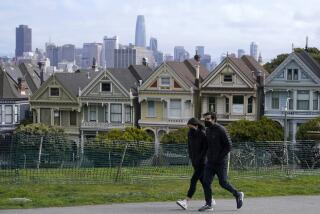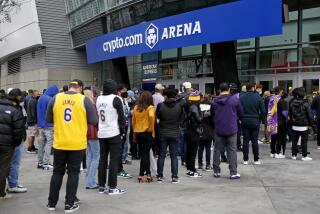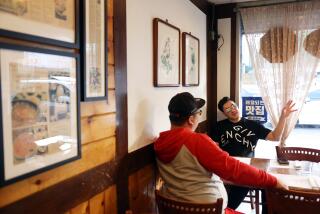Coronavirus spurs San Francisco to ban large gatherings — but school’s in full swing
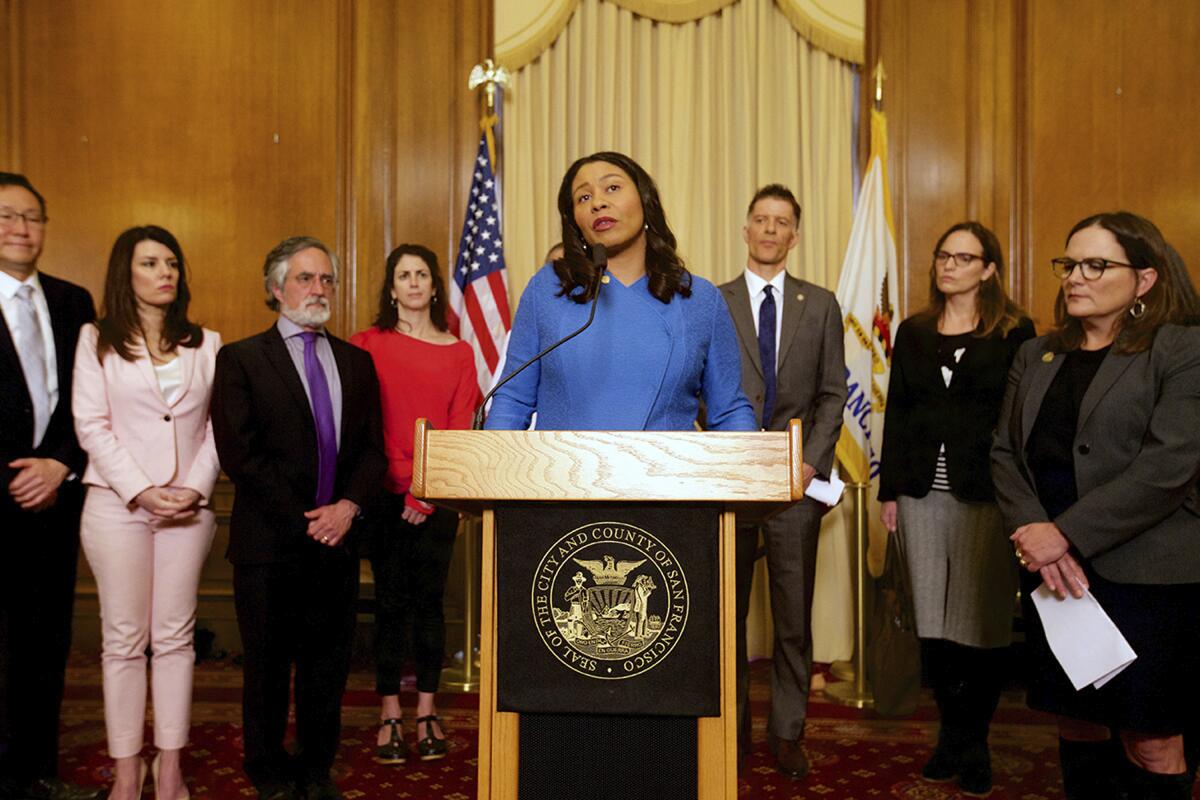
- Share via
SAN FRANCISCO — San Francisco is prohibiting any gathering of more than 1,000 people — including Golden State Warriors games — as the city fights to slow the spread of novel coronavirus, officials announced Wednesday.
“We know that this order is disruptive, but it is an important step to support public health,” Mayor London Breed said in a statement. “We’re following the recommendations of public health officials to slow the spread of COVID-19 in our community.”
Among those affected by the new rule are the Golden State Warriors, whose NBA home games are played in the city.
“We know canceling these events is a challenge for everyone,” Breed said, “and we’ve been talking with venues and event organizers about the need to protect public health. Today I spoke with the Warriors to discuss the steps we’re taking to cancel large events, and they are in support of our efforts.”
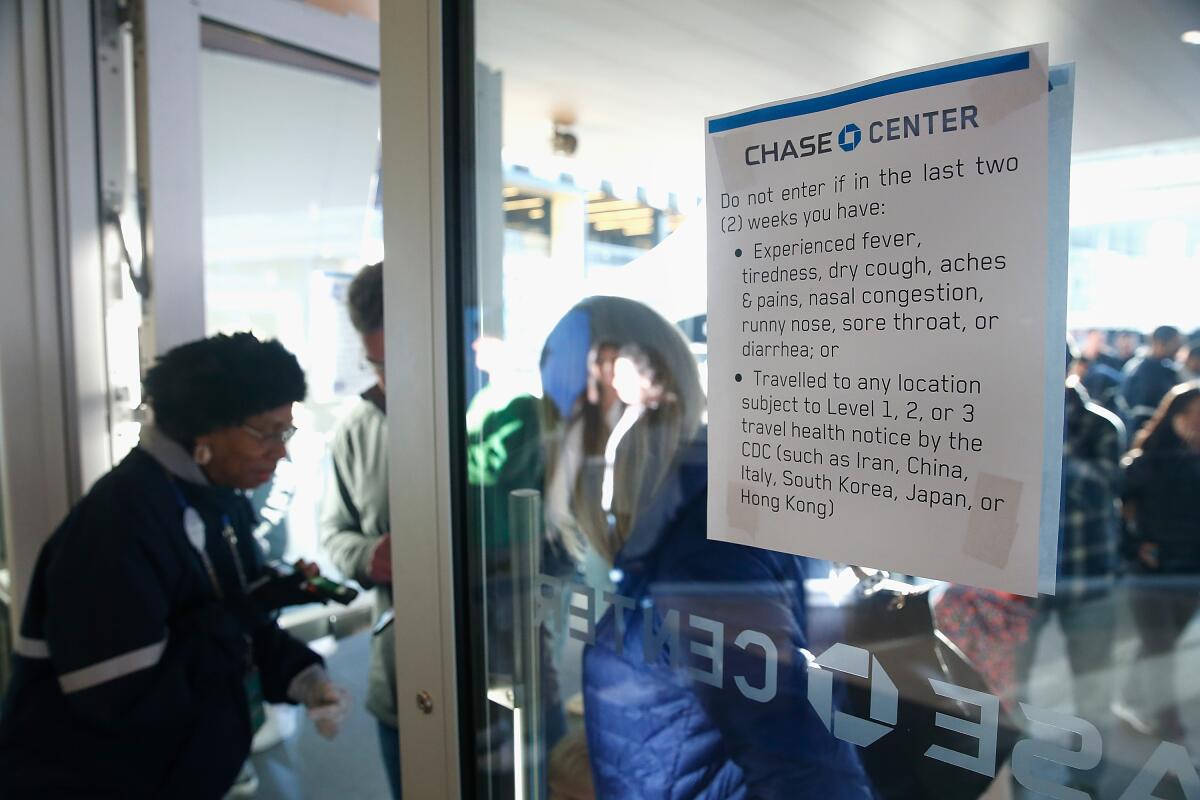
The Warriors said in a tweet that Thursday night’s game against the Nets at Chase Center would be played without fans. Ticket holders will receive a refund.
All events at Chase Center through March 21 are canceled or postponed.
The San Francisco Giants released a statement Wednesday morning stating that their scheduled May 24 exhibition game against the Oakland Athletics would not take place at Oracle Park. The statement added that the teams were working with major league baseball “to finalize alternative arrangements.”
The order banning mass events Wednesday came after the Warriors did not follow a recommendation San Francisco issued Friday that mass gatherings be canceled; the team allowed fans to attend a game Saturday against the 76ers at Chase Center.
Other events in San Francisco have been canceled in recent days, such as the St. Patrick’s Day Parade, the Northern California Cherry Blossom Festival in Japantown, a celebration in honor of Golden Gate Park’s 150th anniversary and performances of the San Francisco Symphony.
Despite its ban on large gatherings, San Francisco has decided to keep its public schools open. Schools are essential services, and children have not been shown to be a high-risk group for serious illness.
Dr. Grant Colfax, health officer for San Francisco, said that closing schools across the region could be part of a future comprehensive plan to slow the spread of illness but that it wasn’t something he recommended right now.
“In children, the illness has been very mild,” Colfax said, adding that in general they either show no signs of physical illness or experience mild flu-like symptoms.
In a study of nearly 45,000 lab-confirmed coronavirus cases in patients, no one under the age of 10 has died from the virus. Rather, the most at risk are older adults, the elderly and those with underlying medical conditions.
“The vast majority of children have mild symptoms and recover well,” Colfax said.
Furthermore, in a region where many people in the Bay Area live and work in multiple counties, the evidence is mixed whether closing all San Francisco schools would make a significant dent in slowing the spread of the virus, he said.
Colfax said one consequence of closing schools would be that it actually would increase the risk of infected children spending time with high-risk populations.
The Archdiocese of San Francisco did not speak with health officials before the Catholic school system decided to close 90 schools from Thursday through March 25, including locations in Marin, San Francisco and San Mateo counties, Colfax said.
In Santa Clara County, the state’s largest area of confirmed COVID-19 cases, health officer Dr. Sara Cody also decided against widespread school closures. But the county has banned large events, including San Jose Sharks home hockey games. Under the Santa Clara County order, the Sharks could continue to play games, just without a crowd.
Testing for the coronavirus began on Monday in San Francisco, Colfax said, and the city has started to use private labs to scale up testing. There are so many requests that health officials are focusing on testing people at highest risk for being critically ill, hospitalized patients, close contacts of those verified to be infected and healthcare workers.
More to Read
Sign up for Essential California
The most important California stories and recommendations in your inbox every morning.
You may occasionally receive promotional content from the Los Angeles Times.
